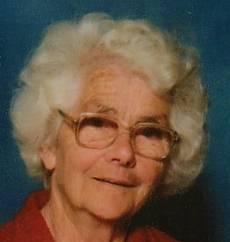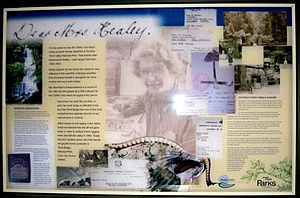Kara Moana Healey facts for kids
Kara Moana Healey (born June 23, 1904 – died June 10, 2006) was an amazing Australian woman. She loved nature and spent her life exploring and protecting it. Kara was a field collector, a conservationist, and a naturalist. She was also the very first female National Park Ranger in Victoria, Australia!
She was born Kara Moana Elizabeth Vernon in New Zealand. Her special name, Karamoana, comes from the Maori language. It means "Rippling waters." Kara was given this name to honor her Maori nurse.
Her family moved back to Australia in 1906. They settled in a place called Mysia, near Bendigo.
Contents
Early Life and Work
Kara was a very bright student. She earned a scholarship to attend Bendigo High School. After school, Kara became a teacher's assistant. She worked at Stuart Mill State School in Victoria.
In 1925, Kara married William Stanley McGreevy, known as Stan. Stan joined the army when World War 2 began. He served for four years in the Middle East. After the war, Stan's health declined. Kara and Stan divorced in 1946.
Kara then found work as a cook at Yarram Hospital. There, she met Jim Healey, who was the caretaker at Tarra Valley National Park. Kara and Jim married in 1948. Sadly, Jim Healey passed away in 1952.
Becoming a Park Ranger
After Jim's death, Kara applied for a job. She was successfully appointed as the Park Ranger at Tarra-Bulga National Park. This made her the first female park ranger in Victoria!
A science group called CSIRO asked for help. They needed people to collect plant and animal samples. These samples would help scientists identify new species. Kara eagerly took on this important task.
Exploring Tarra Valley
For over ten years, Kara collected many specimens. She explored deep into the Tarra Valley. She often went into difficult areas. These places had the best unspoiled plants. They also had the nests of lyrebirds. Kara truly became one with nature.
By 1961, Kara had collected over 160 plant samples. These included different types of toadstools and fungi. Two new types of fungi were even named after her! They were called Poria healeyi and Lambertella healeyi. Poria healeyi was a fungus that caused yellow rot in Mountain Ash trees. Lambertella healeyi was a fungus that grew on another fungus.
Kara also collected animal and insect specimens. She used dead animals she found. In total, she collected over 500 samples. This included 80 different types of moss. Because of Kara's work, Tarra Valley became one of the most studied areas in Australia.
Kara's Scientific Contributions
Neville Walters was a scientist at CSIRO. He said Kara's contributions were "easily the best." She was one of over 150 collectors across Australia. He also said, "She knew every lyrebird in the park." She also knew many other birds. Kara was not afraid of snakes or other animals. The animals were not afraid of her either.
Kara also gave specimens to other places. These included the National Museum of Victoria. She also shared with the University of Melbourne and the National Herbarium. Kara became quite famous. Many newspaper articles were written about her work. She met many leading naturalists of her time.
Observing Wildlife
Kara carefully watched the birds and animals. She wrote down what she saw. She paid special attention to lyrebirds. Male lyrebirds build mounds of earth. They use sticks and other things. Then, they perform a dance. They show off their beautiful tail feathers. This helps them attract a female.
Kara drew sketches of all the specimens. She also drew animals and birds. Later, she used photography. This helped her record specimens in their natural state. She had her films made into "slides." This was very modern at the time. All of Kara's collections and photos are now with Parks Victoria. They have been restored and saved digitally.
Helping Animals and Visitors
Sometimes, Kara's house became an animal hospital. She rescued orphaned wombats and possums. She also helped birds and other animals. She returned them to the wild when they were well.
Her duties at the park included sweeping the tracks daily. Animals, birds, and fallen leaves covered the paths. She also greeted visitors. She collected parking fees from them.
Word of Kara's work spread. Many people came to the park. Kara would give nature talks. She described the plants and animals. Sometimes, she would call a wild bird from a tree. The bird would fly to her hand for a treat!
Later Life and Commemoration
In 1963, Kara married Tom McKean. He was a widower. They lived in Yarram. Kara stayed active with charity work. She helped the Red Cross and Yarram Hospital. She also supported the Save the Children's fund. Tom McKean passed away in 1986.
In 1995, Kara moved to a nursing home. It was called Heytesbury Lodge. This was close to her family.
Kara received an award for her support. It was a certificate of merit from Save the Children Australia. Her daughters joined her at the ceremony in Melbourne. Kara always wanted to help those less fortunate.
Her family celebrated her milestone birthdays. This included her 100th birthday. Over 100 friends and family attended.
Kara passed away on June 10, 2006. She died just 13 days before her 102nd birthday. Many people attended her service in Yarram. This included members from Parks Victoria. Craig Campbell, the current Ranger at Tarra Valley, spoke at the service.
A Special Tribute
In 2007, a special ceremony was held. It was at Tarra Valley Park. This park is now part of Tarra-Bulga National Park. The ceremony was part of the park's 100-year celebration. A special tribute was unveiled. It honored Kara Moana Healey. It recognized her as the first woman park ranger. It also celebrated her important work. Her work helped everyone understand the plants and animals of Tarra Valley.



